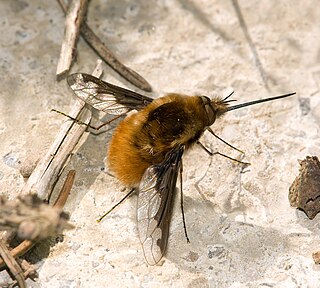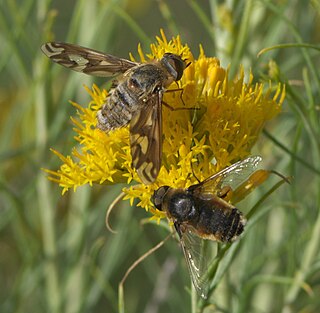
The Bombyliidae are a family of flies, commonly known as bee flies. Some are colloquially known as bomber flies. Adults generally feed on nectar and pollen, some being important pollinators. Larvae are mostly parasitoids of other insects.

Poecilanthrax willistonii, Williston's bee fly or sand dune bee fly, is a member of the Bombyliidae insect family. This family includes the bee flies, true flies that have developed Batesian mimicry characteristics to avoid predators. That is, they look like bees because that helps them avoid bee-wary predators, but they lack stingers.

Ligyra is a genus of bee flies in the Bombyliidae family. It was described by Edward Newman in 1841. There are at least 110 described species in Ligyra.

Toxophorinae is a subfamily of bee flies in the family Bombyliidae. There are five living genera and two extinct genera containing more than 400 described species in Toxophorinae.

Pantarbes capito is a species of bee fly in the family Bombyliidae. It is found in the southwestern United States from California to Wyoming.
Lepidanthrax rauchi is a species of bee fly in the family Bombyliidae. It is found in Mexico and Arizona.
Amphicosmus arizonensis is a species of bee fly in the family Bombyliidae. It is known from Arizona.
Neodiplocampta mirella is a species of bee fly in the family Bombyliidae. It is known from California.
Lepidanthrax disjunctus is a species of bee fly in the family Bombyliidae. It is known from Mexico and Arizona.
Lepidanthrax eremicus is a species of bee fly in the family Bombyliidae. It is known from California.
Bombylius lancifer is a species of bee fly in the family Bombyliidae. It occurs in western North America.

Exoprosopa caliptera is a species of bee flies in the family Bombyliidae. Its range is noted as being in British Columbia, Canada, as well as throughout the Western United States, Arkansas, and South Dakota. It is also found in the Mexican state of Durango.

Geron is a genus of bee flies in the family Bombyliidae. There are at least 180 described species in the genus Geron, found on every continent except Antarctica.
Systropus macer is a species of bee fly in the family Bombyliidae. It is found in eastern North America in Ontario, Canada, and in the United States from Massachusetts south to Georgia and Texas. It is a parasitoid of Limacodidae caterpillars, including Adoneta spinuloides, Euclea delphinii, Lithacodes fasciola, Prolimacodes badia, and Parasa indetermina.
Xenox delila is a species of bee fly in the family Bombyliidae. It is found in California and Baja California Norte.

Anastoechus hessei is a species of bee fly in the family Bombyliidae. It is found in the southwestern United States from California to Texas. Its larvae are predators of grasshopper eggs.
Geron calvus is a species of bee fly in the family Bombyliidae. It is found in the northeastern United States from Virginia north to Ontario, Canada.
Paravilla aridula is a species of bee fly in the family Bombyliidae. It is found in Arizona and California.
Hemipenthes inops is a species of bee fly in the family Bombyliidae. It is found in the western United States. It is somewhat unusual compared to other members of the genus Hemipenthes in that its wings are mostly transparent.







